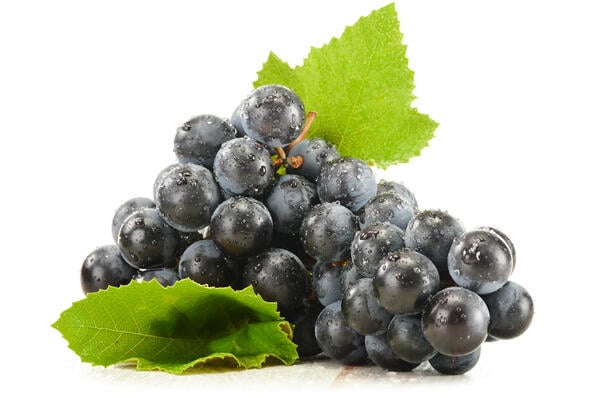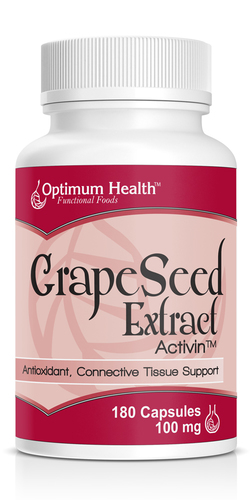
Often, when looking for the “newest, latest, and greatest” discoveries in nutritional science we tend to overlook past discoveries, assuming that the newest supplement will be more effective, or health giving. But this is not always the case. For example, one of the most under-appreciated supplements, forgotten by most, which offers profound benefits is Grape Seed Extract.
OPC's Are What Makes Grape Seed Extract So Beneficial
The beneficial constituents in grape seed extract are known as OPC’s, (oligmeric proanthocyanidins). Though OPCs do occur in foods such as fruits, berries, cocao, and tea, the most common concentrated supplement forms are grape seed extract, and its trademarked “sister compound” from pine bark called Pycnogenol. Though the two are very similar, Grape Seed Extract is usually considered superior because its OPCs are in an esterified form, and this is said to provide superior antioxidant protection. Grape Seed Extract is markedly less expensive, and also is what most of the research on OPCs has actually used.
What is Grape Seed Extract Good For?
Grape seed extract benefits include widespread antioxidant protection, but more importantly, it binds to your connective tissue providing increased strength and flexibility, and decreasing inflammation and degradation. This applies equally to your blood vessels, your joints, your skin, and pretty much anywhere else there is connective tissue throughout the body. Though this may not sound very exciting, the practical benefits are extremely numerous, and far reaching.
The protective effects of OPCs on connective tissue mean Grape Seed Extract will help your skin, arteries, and veins remain stronger and more flexible. Additionally, its antioxidant effects against free-radical damage not only protect the walls of your blood vessels, but also the fats and cholesterol within the blood. Together, these yield better blood flow and oxygen delivery, and this applies even to the microvasculature, i.e. the smallest capillaries in your brain, and eyes for example.
Strong research in this area shows that grape seed extract is helpful not only for preventing atherosclerosis, i.e. hardening of the arteries, and varicose veins, but for many other aspects of cardiovascular health as well, including protecting brain function and vision.
The strengthening effect of the OPCs in Grape Seed Extract on your connective tissues helps to maintain the elasticity of your skin as well, and stop it from sagging and wrinkling. This is why OPCs/grape seed extract are added to so many skincare products. And, by increasing production of nitric oxide (i.e. Endothelium Derived Relaxing Factor) in your bloodstream, grape seed extract can help relax your arteries, and accordingly can have favourable effects on such things as blood pressure, and erectile dysfunction in men.
Anti-inflammatory Actions
 Grape Seed Extract also possesses anti-inflammatory actions, largely due to its ability to block enzymes which break down connective tissue. As such it can be very helpful for preventing arthritis, or to speed-up tissue regeneration after surgery, injury, or athletic stress. It can also be helpful in preventing and healing sunburns, and other forms of radiation damage.
Grape Seed Extract also possesses anti-inflammatory actions, largely due to its ability to block enzymes which break down connective tissue. As such it can be very helpful for preventing arthritis, or to speed-up tissue regeneration after surgery, injury, or athletic stress. It can also be helpful in preventing and healing sunburns, and other forms of radiation damage.
Grape seed extract has been shown in several trials to be antimutagenic, and anticarcinogenic, including a study in 2008 which showed that grape seed extract induced apoptosis (programmed cell death) in leukemia cells.(1)
At Optimum Health, we recommend the Activin trademark as it is guaranteed to be organic, and free of toluene – a solvent commonly used on grape seeds in the OPC extraction process.
I encourage everyone to look at the impressive evidence for Grape Seed Extract. If you are only willing to consider references from peer-reviewed articles, see the 2003 monograph from Alternative Medicine Review below (2), or for the entire article including reference list contact the Information and Research Desk at our 109 street store in Edmonton where we have it on file, and will be pleased to provide it for you.
Be well,
John

References:
(1) "Induction of Apoptosis in Human Leukemia Cells by Grape Seed Extract Occurs via Activation of c-Jun NH2-Terminal Kinase."
Ning Gao, Amit Budhraja, Senping Cheng, Hua Yao, Zhuo Zhang, and Xianglin Shi
Clin Cancer Res Vol 15, Issue 1, pages 140-149, Published 1 January 2009
doi: 10.1158/1078-0432.CCR-08-1447
(2) OPC_Monograph
Disclaimer: The above information is provided for informational purposes only and is not intended to replace the advice of your physician.

